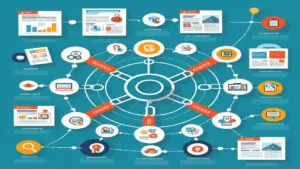SEO Strategies for Small Businesses: How to Rank Higher on Google
The Harsh Truth Small Businesses Face
If you run a small business, chances are you’ve felt this pain before:
You spent weeks (sometimes months) building your website. You added all your products or services. Maybe you even wrote a blog or two. You hit publish, expecting leads and customers to come pouring in.
But nothing happened.
No clicks. No calls. No sales.
It feels like shouting into a void.
And here’s the kicker: when you Google your business or your services, you’re nowhere to be found. Instead, bigger brands with deeper pockets dominate the first page of Google.
That’s frustrating. And it’s the exact challenge thousands of small businesses face every day.
But here’s the good news: you can compete and even outrank the big players if you use the right SEO strategies.
In this blog, I’ll walk you through practical, proven SEO tactics small businesses use to climb Google rankings. I’ll also share real-world case-style examples that show what actually works.
Why SEO Is the Best Marketing Channel for Small Businesses
Let’s be honest. Small businesses don’t usually have big ad budgets. Running Google Ads or Facebook Ads every single day isn’t sustainable when you’re trying to keep costs lean.
SEO, on the other hand, is different.
Done right, it brings in consistent, compounding traffic. Instead of paying for each click, your website keeps showing up day after day when people search for your product or service.
That’s the difference between chasing customers and having them come to you.
Case Study: The Local Bakery That Beat the Chains
A bakery owner in Austin once came to us with a familiar story:
“We’re getting crushed by Starbucks and Panera Bread. People don’t even know we exist online.”
Here’s what we did:
- Optimized their Google Business Profile with local keywords (“best bakery in Austin,” “fresh sourdough Austin”).
- Built a handful of backlinks from local food bloggers.
- Added content around their most profitable items, like “custom birthday cakes Austin.”
Result? Within 6 months, their website went from page 5 to page 1 of Google. Organic traffic grew by 247%. And more importantly walk-ins and custom orders doubled.
The point here is clear: you don’t need a massive SEO budget. You need smart, targeted SEO.
5 SEO Strategies Small Businesses Can Use to Rank Higher
1. Focus on Local SEO First

Most small businesses serve a local audience. That means your priority shouldn’t be competing nationally it should be owning your local market.
Action steps:
- Claim and optimize your Google Business Profile.
- Add location-specific keywords to your website.
- Get listed in local directories (Yelp, Yellow Pages, TripAdvisor, niche-specific sites).
- Collect real customer reviews Google uses them as a ranking factor.
Think of local SEO as low-hanging fruit. It’s often easier and faster than trying to compete on national search terms.
2. Build Content That Solves Problems

Too many small business websites only talk about themselves. “We’ve been in business since 2010…” “We sell high-quality products…”
That’s fine, but here’s the truth: customers don’t care about you they care about their problems.
Instead of only listing your services, create blog posts, guides, and FAQs that answer customer questions.
Examples:
- A plumber could write: “Why Does My Sink Keep Clogging?”
- A dentist could write: “How Often Should You Replace Your Toothbrush?”
- A marketing agency can write: “How Small Businesses Can Rank Higher on Google Without Big Budgets.”
This kind of content builds trust and attracts search traffic because you’re meeting people where they are before they’re even ready to buy.
3. Leverage Backlinks the Smart Way

One of the biggest Google ranking factors? Backlinks.
But small businesses don’t need thousands of them. You just need the right ones.
Here’s how:
- Reach out to local blogs, newspapers, and community sites.
- Offer to write guest posts on industry-specific sites.
- Build partnerships with other small businesses where you cross-link each other.
Remember: one backlink from a trusted, relevant site often outweighs 100 random ones.
4. Optimize for Mobile and Speed

Here’s something many small business owners overlook:
If your website loads slowly or looks bad on mobile, Google won’t rank it high period.
Stats show:
- 53% of mobile users leave a site if it takes more than 3 seconds to load.
- Google has publicly stated site speed is a ranking factor.
Run your site through Google PageSpeed Insights. Fix what’s slowing it down like heavy images, bad hosting, or too many plugins.
5. Track, Measure, Adjust
SEO isn’t “set it and forget it.”
The businesses that win treat SEO like a process:
- Track rankings and traffic.
- See what content is working.
- Double down on winners.
- Fix or delete content that doesn’t perform.
Use free tools like Google Analytics and Google Search Console.
Case Study: Small E-commerce Store Tripled Sales with SEO

Another client, a small e-commerce store selling eco-friendly kitchen products, struggled because Amazon dominated their space.
Instead of trying to compete head-on, we identified long-tail keywords:
- “plastic-free lunchbox for kids”
- “eco-friendly kitchen sponge alternatives”
By creating SEO content around those terms, optimizing product pages, and building a few targeted backlinks, their organic sales grew 3.5x in 12 months.
The key lesson: go after specific opportunities where big players aren’t paying attention.
Why Small Businesses Shouldn’t Ignore SEO
Look, SEO isn’t a magic bullet. It takes time, effort, and consistency.
But here’s the reality: every day you wait, your competitors are moving ahead.
And the best part? Unlike ads, the traffic doesn’t stop when your budget runs out. Once you rank, you keep getting clicks for months sometimes years.
If you’re serious about building long-term visibility and revenue, SEO is non-negotiable.
Final Thoughts
Ranking higher on Google isn’t about outspending the competition. It’s about outsmarting them.
- Focus on local SEO.
- Create content that solves customer problems.
- Get smart backlinks.
- Keep your site fast and mobile-friendly.
- Track and refine.
Small businesses that take these steps consistently see results. The bakery that outranked Starbucks. The e-commerce brand that tripled sales. They didn’t do it with million-dollar budgets. They did it with smart SEO.
And you can too.
If you’re ready to take the next step, check out our BuzzCatalist SEO Services
. We help small businesses like yours climb Google rankings and drive meaningful growth.
